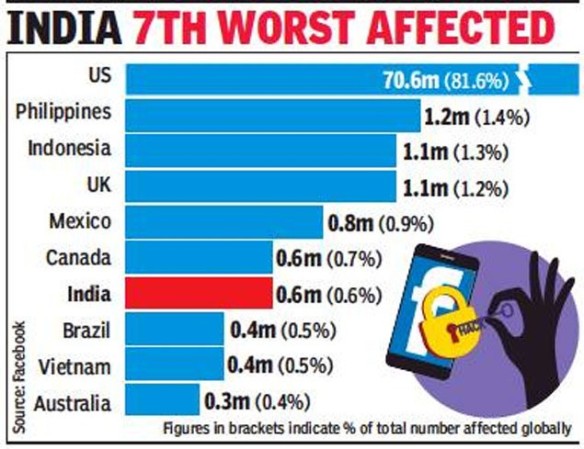Episode 3: The Indian Angle
Although a little late, here is part 3 of the Facebook fiasco series, wherein I discuss the actions that CA and SCL have taken in India and their effects in elections. To know what the fiasco is all about, check out Part 1, and to know the political impact around the world and how it came to be known, check out Part 2.
Many people know of India as the largest democracy in the world. Being in line with that, when elections are held here, it is rightly treated as the big deal that it is. But with the elections come the corresponding duties such as regulating the elections. There are many instances of bribery and other nefarious activities taking place during elections. There is always the murky after-taste of vote bank politics and it dividing the citizens of India.
Amidst all these less than savoury claims, comes the allegations (and even some truths) about the involvement of Cambridge Analytica in the India election.

Does it really have a presence in India?
As stated in the previous article, Strategic Communication Laboratories (SCL) is the parent firm of Cambridge Analytica (CA). They have a subsidiary company known as the Strategic Communication Pvt. Ltd. (SCL India) in India; with the 4 directors being Alexander James Nix, Alexander Waddington Oakes, Amrish Kumar Tyagi and Avneesh Kumar Rai. Both the Alexanders are the co-founders of SCL in UK back in 2005. Tyagi is the son of JD (U) Leader K.C. Tyagi – which shows the level of impartiality undertaken by this group. Avneesh Kumar Rai is an election consultant with politicians irrespective of their parties since 1984.
Here is a short timeline of events of how Rai ensured the entry of SCL to India.
- 2009: In Lok Sabha elections, Rai who was working with BJP Leader Mahesh Sharma, was confused by the loss of the seat. Thus he got in touch with Dan Muresan of SCL UK. They conducted a video that listed the reasons for Sharma’s loss. Being impressed by their methods, Rai wanted to work more with them.
- 2010: Muresan came to Delhi, and wanted to collaborate with Rai as Rai had been involved in creating a database of households in many states, which included details such as their names, caste, political preferences etc. This is how SCL UK started working with Ovleno Business Intelligence.
- 2011: Nix, Muresan, their team from UK along with Tyagi and Rai started contacting politicians and selling their services.
- Nix was obsessed with Congress and making a foray into Indian elections from there. But Rai was confused after a couple of months to find that questions which sounded like they were anti-Congress being asked in the database survey.
- Rai also overheard a conversation between a member and an Indian-American woman of Gujarati origin who had flown down to India, where she introduced herself as being from the client’s side. Until then, as far as Rai knew, they were working for no client and were just collecting data to pitch their services to Congress. It was peculiar that they were collecting data from Congress only to campaign against them. When he confronted Nix, he said he did it to make money.
- During this time, Muresan who was in Kenya died under suspicious circumstances and his role was taken up by Nix.
- The work slowly fizzled out as Rai refused to part with the data and Nix concentrated on the more profitable US elections.
Wylie’s Comments:
Recently, Christopher Wylie blew the whistle on the operations of Cambridge Analytica. As part of the same, he was deposing before the House of Commons Digital, Culture, Media and Sport Committee of the British Parliament. Wylie responded as follows when questioned about CA’s participation in India:
“They (Cambridge Analytica) worked extensively in India. They have an office in India. I believe their client was Congress, but I know that they have done all kinds of projects. I don’t remember a national project but I know regionally. India’s so big that one state can be as big as Britain. But they do have offices there, they do have staff there.”
He also offered to provide “documentation” on India.
Although Congress is said to be one of the clients, it is unsure whether there are other clients. Reports suggest that Nix was in talks with several parties and wanted to design an electoral strategy. Tyagi, who is the son of JD (U) leader K.C. Tyagi could have given input to them too.
Statement by Facebook:
On April 5th, Facebook released a statement saying that the data of over 5.6 lakhs users was harvested and shared with Cambridge Analytica. According to the numbers released by Facebook, India is the 7th worst affected country in terms of data loss.

Will the Facebook data mined from Indian users really affect the elections?
It is true that in the US, it may have had a significant effect on people when it came to targeted advertising based on elections. But according to the survey conducted by the Centre for the Study of Developing Societies in 2016, there is not sufficient data of Indians in Facebook yet. Only 19% of young voters have high access to social media. Which means that 81% do not use social media regularly; or even if they use Facebook, it is not often enough to give out important profile-worthy information.
According to Vivan Marwaha, the founder of Vantage Analytics:
Ultimately, in order for Cambridge Analytica to truly make a difference and decide elections in India, it will need to machine-learn caste equations, religious tensions, gender relations, welfare networks, economic anxieties, urban challenges, and the countless other factors that the Indian voter considers before going to the ballot box.
Fortunately, it is not there yet.
So what does this mean?
It means that although data was taken, not much of it must have been useful to the companies with regard to profiling the people in a way which would be helpful for the elections. This is not because they didn’t have the abilities, but because India is still developing in its use of social media. Although it seems like good news now, the fact that India has been growing in leaps and bounds in these aspects means that it is more than possible to have a wider impact in the future.
Until then be safe with your data.
Thank you for sticking with me till the end of this series!

